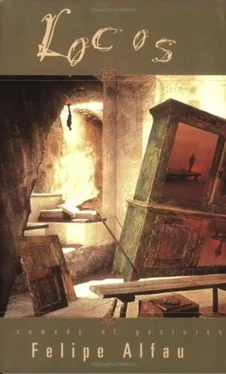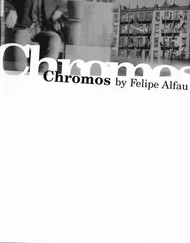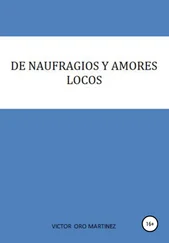The curtains were drawn and the room was in shadow. I looked around but did not see the dogs.
Garcia recognized my step. His intuition seemed sharpened by the approach of death. He turned his head toward me and there was eagerness in his expression.
“Did you close the door when you came in?” His voice was almost inaudible and accompanied by a whistling.
“Yes. Lunarito closed it.” He seemed relieved.
“For three days I have had all balconies and doors closed. I am keeping the enemy away. Spring has been here three days already. It has come to get me, but I do not let it enter. . I keep all balconies and doors shut. It is a real siege.
“Three days spring has been hovering around. roaming about the house, right outside the balconies, trying to push its way in. There it goes now. Can you hear it crackling? Can you hear it humming? Can you hear its reinforcements approaching? Listen. listen.!”
I remained silent. Instinctively I listened. And that moment I heard in the distance the sound of horses’ hoofs upon the pavement, they were approaching. and soon a carriage passed by the street and I heard young and cheerful voices. And then the sound of the whole city outside, the sound of life and nature.
Garcia dropped the hand which he had raised. A great relaxation had come over his countenance. He looked infinitely tired and resigned.
“Three days of this. It is no use. One cannot hold out against such a foe. Life is stronger than man. It is no use. I must give in.” He made a last effort to lift himself and turned toward me. “Let us end it now.. I am choking. Go, go open that window. ”
Mechanically I moved, I felt that every limb in me acted regardless of my will. I threw the curtains aside and a stream of light inundated the room. Then I lifted the hook and flung the window open.
Spring came in.
FINIS
Fifty-two years ago, on June 27, 1936, I reviewed a book in the Nation . Very favorably. The author, Felipe Alfau, was said to be a young Spaniard writing in English. Spain was Republican then; the Franco revolt that turned into the Spanish Civil War began on July 19, three weeks and a day later. The charm exercised on me by Locos, therefore, cannot have been a matter of politics. And I was ignorant of Spain and Spanish. It was more like love. I was enamored of that book and never forgot it, though my memory of it, I now perceive on rereading, is somewhat distorted, as of an excited young love affair. Alfau, or his book, was evidently my fatal type, which I would meet again in Vladimir Nabokov’s Pale Fire and more than once in Italo Calvino. But Zocos was the first. And it appears to have been the author’s unique book, fittingly, as it were. I never heard of Alfau again, though for a time I used to ask about him whenever I met a Spaniard; not one knew his name. Maybe that was because he lived in the United States, if indeed he did. But in this country I never found anyone besides me who had read Locos. Now the book is being reissued. Launched more than fifty years ago by a Farrar and Rinehart club of so-called “Discoverers,” it has been rediscovered, by what means I don’t know.
To come back to it has been a bit eerie, at least on first sight — a cross between recognition and non-recognition. For example, what has stuck in my memory is a lengthy account of a police convention in Madrid that coincided merrily with a crime wave, the one giving rise to the other: crooks converged on the city, free to practice their trade while the police attended panel discussions and lectures on criminality. Well, it would be too much to say that none of that is in Locos ; it is there but in the space of a few sentences and as a mere suggestion.
The fifth chapter, “The Wallet,” begins: “During the 19— police convention at Madrid, a very unfortunate occurrence took place. Something went wrong with the lighting system of the city and the whole metropolis was left in complete darkness.” It is the power failure that offers the assembled criminals their opportunity. “It was a most deplorable thing, for it coincided with the undesirable immigration of a regular herd of international crooks who since the beginning of the World War had migrated into Spain and now cooperated with resident crooks in a most energetic manner. As if all these people had been waiting for that rare opportunity, the moment the lights went out in Madrid, thieves, gunmen, holdup men, pickpockets, in short all the members of the outlaw family, sprang up in every corner as though by enchantment.” Then: “. it came to pass that during the Police Convention of 19—, Madrid had a criminal convention as well. Of course, the police were bestowing all their efforts and time upon discussing matters of regulation, discipline and now and then how to improve the method of hunting criminals. and naturally, after each session. had neither time nor energy to put a check to the outrages. Therefore all crooks felt safer and freer to perform their duty in Madrid, where the cream of the police were gathered, than anywhere else.”
That is all, a preamble. The body of the chapter has to do with the stolen wallet of the Prefect of Police. The power failure, which provides a realistic explanation, had slipped my memory, and I was left with the delightful illogic — or logic — of parallel conventions of police and criminals. The purest Alfau, a distillate.
“The Wallet,” actually, may be the center of the book, whose subject is Spain regarded as an absurdity, a compound of beggars, pimps, policemen, nuns, thieves, priests, murderers, confidence artists. The title, meaning “The Crazies,” refers to a Café de los Locos in Toledo, where in the first chapter virtually all the principal characters are introduced as habitués suited to be “characters” for the bad fiction writers who, like the author, drop in to observe them. There are Dr. de los Rios, the medical attendant of most of the human wreckage washed up at those tables; Gaston Bejarano, a pimp known as El Cogote; Don Laureano Baez, a well-to-do professional beggar; his maid/daughter Lunarito, Sister Carmela, who is the same as Carmen, a runaway nun; Garcia, a poet who becomes a fingerprint expert; Padre Inocencio, a Salesian monk; Don Benito, the Prefect of Police; Felipe Alfau; Don Gil Bejarano, a junk dealer, uncle of El Cogote; Pepe Bejarano, a good-looking young man, brother of El Cogote; Doña Micaela Valverde, a triple widow and necrophile.
Only missing is the highly significant Señor Olózaga, at one time known as the Black Mandarin, a giant, former galley slave, baptized and brought up by Spanish monks in China, former butterfly charmer in a circus, former potentate in the Spanish Philippines, now running a bizarre agency for the collection of delinquent debts and another for buying and selling dead people’s clothes. But he is connected with the other “characters” of the Café de los Locos both in his own right and by marriage to Tia Mariquita, his fifth wife, who lives in a house that coughs — their secretary, mistaken for her husband, is murdered by Don Laureano Baez and his daughter/maid Lunarito — one of many cases of mistaken identity. As the Black Mandarin in the Philippines, he has sought the hand of the blue-eyed daughter of Don Esteban Bejarano y Ulloa, a Spanish official, and been rejected because of his color. This, precisely, was the father of Don Gil Bejarano (see above), the brother-in-law of the Prefect of Police and inventor of a theory of fingerprints, which pops up in Chapter 4, where, incidentally, we find Padre Inocencio playing cards with the Bejarano family while the young daughter, Carmen, is having sex with her brother Gaston.
Such underground — or underworld — links are characteristic and combine with the rather giddy mutability displayed by the characters. Lunarito is Carmen, who is going to be Sister Carmela; at one point we find her married to El Cogote, none other than her brother Gaston, who cannot, of course, be her brother if she is the daughter of the beggar, Don Laureano Baez. And yet Don Laureano’s wife, when we are introduced to him as the bartender of the Café de los Locos, is Felisa, which is the name of Carmen’s mother, the sister of Don Benito, the Prefect of Police. In the Prologue, and occasionally thereafter, the author makes a great point of the uncontrollability of his characters, but this familiar notion (as in “Falstaff got away from Shakespeare”) is the least interesting feature. The changing and interchanging of the people, resembling “shot” silk, has no need of the whimsy of a loss of auctorial control. If any aspect of the book has aged, it is this whimsicality.
Читать дальше












